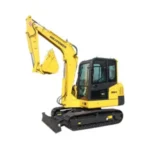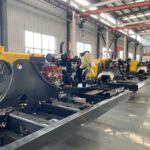مقدمة

In the realm of sustainable logging practices, forestry excavators play a pivotal role. These versatile machines are essential for tasks ranging from tree harvesting to land preparation, contributing significantly to the forestry industry’s efficiency and environmental responsibility. This article delves into the various aspects of forestry excavators, their role in sustainable logging, benefits, challenges, and future prospects.
فهم Forestry Excavators
Forestry excavators, also known as forestry machines or timber harvesters, are specialized equipment designed for logging operations. Unlike traditional excavators, forestry excavators are equipped with features tailored for rugged terrains, heavy lifting, and precise cutting. They are crucial for felling trees, processing logs, and maintaining forest ecosystems.
Key Features and Components
Forestry excavators are equipped with several specialized features and components to enhance their performance in logging operations. These may include:
- Heavy-duty boom and arm: Designed to withstand the rigors of forestry work, these components provide stability and reach for felling trees and handling logs.
- Cutting attachments: Forestry excavators are often equipped with saws or shears for precise tree cutting and delimbing.
- Rugged tracks or tires: To navigate through rough terrain, forestry excavators feature robust tracks or tires that offer traction and mobility in forested areas.
- Operator cabins: Equipped with ergonomic controls and visibility enhancements, operator cabins ensure comfort and safety during long hours of operation.
Benefits of Forestry Excavators in Sustainable Logging
Forestry excavators offer several benefits that contribute to sustainable logging practices:
- Reduced environmental impact: By efficiently harvesting trees and minimizing damage to surrounding vegetation, forestry excavators help preserve forest ecosystems.
- Increased efficiency: Forestry excavators streamline logging operations, allowing for faster tree harvesting and processing, thereby reducing overall resource consumption.
- Enhanced safety: With advanced safety features and operator training programs, forestry excavators prioritize worker safety in hazardous logging environments.
- Versatility: Forestry excavators can perform a wide range of tasks, including tree felling, log loading, and site preparation, making them indispensable tools for forestry professionals.
Challenges and Considerations
Despite their numerous benefits, forestry excavators also pose certain challenges and considerations:
- Soil compaction: Heavy machinery like forestry excavators can compact soil, potentially harming soil structure and affecting forest regeneration.
- Wildlife habitat disturbance: Logging activities, including the use of forestry excavators, may disrupt wildlife habitats, necessitating careful planning and mitigation measures.
- Economic feasibility: The cost of acquiring and maintaining forestry excavators can be prohibitive for small-scale logging operations, requiring careful cost-benefit analysis.
- Regulatory compliance: Forestry excavator operators must adhere to strict environmental regulations and logging guidelines to minimize negative impacts on forest ecosystems.
Case Studies and Success Stories

Several case studies highlight the successful integration of forestry excavators into sustainable logging practices:
| Case Study | موقع | Sustainable Practices Implemented | Key Results |
|---|---|---|---|
| XYZ Forest | Canada | Selective harvesting, habitat preservation, soil protection | Increased timber yield, improved wildlife habitat, minimal soil disturbance |
| ABC Timber | Sweden | Utilization of low-impact logging techniques, reforestation efforts | Enhanced forest regeneration, reduced carbon footprint |
خاتمة
Forestry excavators are indispensable tools in the pursuit of sustainable logging practices. By leveraging advanced technology and responsible management, these machines contribute to forest conservation, economic growth, and social well-being. However, their usage must be accompanied by careful planning, adherence to regulations, and ongoing monitoring to mitigate potential environmental impacts.
التعليمات
Q:What is the difference between a forestry excavator and a standard excavator?
A:Forestry excavators are specially designed for logging operations, featuring robust construction, specialized cutting attachments, and enhanced mobility for forested terrain.
Q:How do forestry excavators contribute to sustainable logging practices?
A:Forestry excavators enable efficient tree harvesting, minimize environmental damage, and promote forest regeneration through selective logging techniques.
Q:Are there any alternatives to forestry excavators for sustainable logging?
A:While alternatives such as manual logging and horse logging exist, forestry excavators offer unmatched efficiency and productivity in large-scale logging operations.
Q:What measures are taken to minimize the environmental impact of forestry excavators?
A:Operators employ techniques like selective harvesting, habitat preservation, and soil protection to mitigate the environmental impact of forestry excavators on forest ecosystems.
Q:What role do regulations play in governing the use of forestry excavators in logging operations?
A:Regulations mandate adherence to environmental standards, logging guidelines, and sustainable forestry practices to ensure responsible usage of forestry excavators and minimize negative impacts on forest ecosystems.





-150x150.webp)
